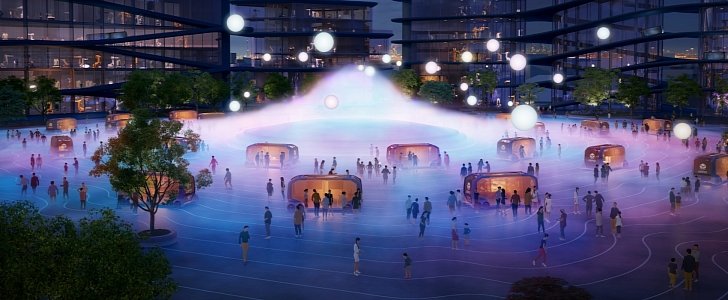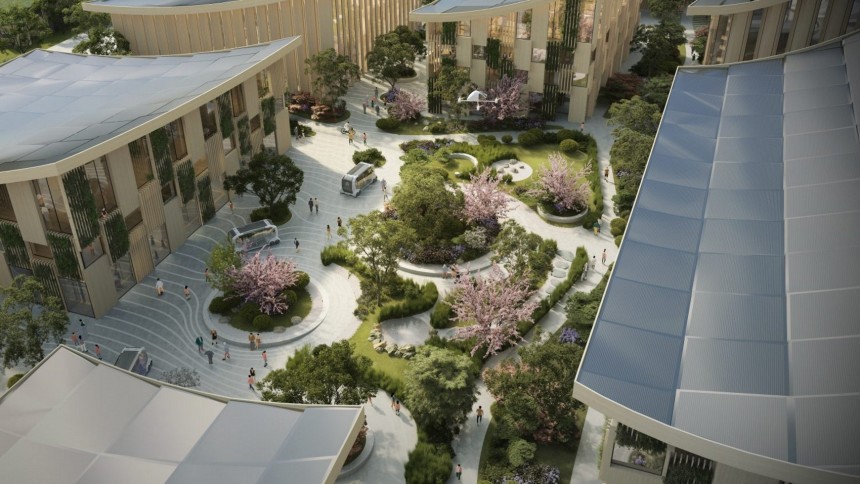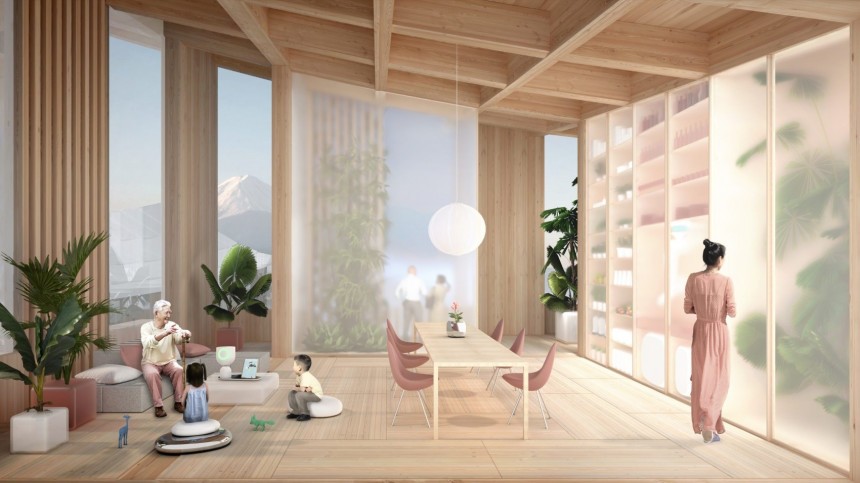Toyota is looking to the future – and the future holds an exciting, new proposition for urban life, in the form of a fully connected ecosystem called Woven City. Toyota will start building it in 2021.
As Akio Toyoda, president, Toyota Motor Corporation said at the big presentation at CES 2020 in Las Vegas, “if you build it, they will come.” They, in this context, is an estimated 2,000 residents (for starters), comprised of Toyota employees and researchers, as well as retired couples and retailers, independent researchers and industry partners, who will live in the newfound Toyota city.
Woven City won’t be a test lab but a bonafide living laboratory, a real-world incubator. It will look and act like a proper city that will allow for extended testing of new technology, with a focus on autonomous vehicles and artificial intelligence. Spanning 175 acres, it will be situated at the foot of Mount Fuji in Japan, and will feature Toyota technology already developed or in progress, like the e-Palette robots and shuttles, and also smart homes and human support tech.
“Building a complete city from the ground up, even on a small scale like this, is a unique opportunity to develop future technologies, including a digital operating system for the city’s infrastructure,” Toyoda explains in a press release. “With people, buildings and vehicles all connected and communicating with each other through data and sensors, we will be able to test connected AI technology… in both the virtual and the physical realms … maximizing its potential.”
Woven City will be designed by Danish architect Bjarke Ingels, CEO, Bjarke Ingels Group (BIG), whose previous projects include the Lego House in Denmark, the 2 World Trade Center buildings in NYC, and Google’s Mountain View and London HQ buildings. Ingels believes this project will pave the way for a new form of urbanity, one that maximizes the use of technology for an improved quality of life, which will hopefully be adopted by other cities as well.
Woven City will be a fully connected and sustainable ecosystem. It will be powered by hydrogen fuel cells but will also harness solar power through roof-mounted solar panels. Residences will have as small a footprint as possible, and will be made of wood in typical Japanese style but using modern, robotic production methods.
The homes will be anything but old-school inside: in-home robotics will assist with daily living, Toyota says. Sensor-based AI will check on the residents’ health and take care of basic needs, enhancing daily life and providing a sense of security and positivity. Hopefully, it will be nothing like the sense of security humanity (fictionally) experienced right before Skynet became self-aware in Terminator.
The streets of Woven City will be of three types, depending on the usage they’re designed for: for faster vehicles only; for lower speed, personal mobility and pedestrians; and for pedestrians only (park-like promenades). They will weave in an “organic grid pattern” meant to facilitate expansive testing on autonomy.
Speaking of autonomy, Toyota says that only zero-emission, fully autonomous vehicles will be allowed in the city. Transportation, deliveries and changeable mobile retail will be carried out using e-Palettes.
With a clear focus on technology, both existing and emerging, Toyota is not letting the human component in Woven City slip through the cracks. According to the same press statement, considerable emphasis will be placed on human connectivity, mostly through the inclusion of a central plaza for gatherings, recreational and neighborhood parks. In Toyota’s vision, the future of humanity will probably be less alienating than it already is.
Toyota is currently extending invitations to industry partners interested in contributing to the prototype city. An ecosystem of this type can only be carried out through sustained, joined efforts.
“We welcome all those inspired to improve the way we live in the future, to take advantage of this unique research ecosystem and join us in our quest to create an ever-better way of life and mobility for all,” Toyoda explains.
For at least a couple thousand very lucky people, the future officially starts in 2021, when building Woven City kicks off.
Woven City won’t be a test lab but a bonafide living laboratory, a real-world incubator. It will look and act like a proper city that will allow for extended testing of new technology, with a focus on autonomous vehicles and artificial intelligence. Spanning 175 acres, it will be situated at the foot of Mount Fuji in Japan, and will feature Toyota technology already developed or in progress, like the e-Palette robots and shuttles, and also smart homes and human support tech.
“Building a complete city from the ground up, even on a small scale like this, is a unique opportunity to develop future technologies, including a digital operating system for the city’s infrastructure,” Toyoda explains in a press release. “With people, buildings and vehicles all connected and communicating with each other through data and sensors, we will be able to test connected AI technology… in both the virtual and the physical realms … maximizing its potential.”
Woven City will be designed by Danish architect Bjarke Ingels, CEO, Bjarke Ingels Group (BIG), whose previous projects include the Lego House in Denmark, the 2 World Trade Center buildings in NYC, and Google’s Mountain View and London HQ buildings. Ingels believes this project will pave the way for a new form of urbanity, one that maximizes the use of technology for an improved quality of life, which will hopefully be adopted by other cities as well.
The homes will be anything but old-school inside: in-home robotics will assist with daily living, Toyota says. Sensor-based AI will check on the residents’ health and take care of basic needs, enhancing daily life and providing a sense of security and positivity. Hopefully, it will be nothing like the sense of security humanity (fictionally) experienced right before Skynet became self-aware in Terminator.
The streets of Woven City will be of three types, depending on the usage they’re designed for: for faster vehicles only; for lower speed, personal mobility and pedestrians; and for pedestrians only (park-like promenades). They will weave in an “organic grid pattern” meant to facilitate expansive testing on autonomy.
Speaking of autonomy, Toyota says that only zero-emission, fully autonomous vehicles will be allowed in the city. Transportation, deliveries and changeable mobile retail will be carried out using e-Palettes.
Toyota is currently extending invitations to industry partners interested in contributing to the prototype city. An ecosystem of this type can only be carried out through sustained, joined efforts.
“We welcome all those inspired to improve the way we live in the future, to take advantage of this unique research ecosystem and join us in our quest to create an ever-better way of life and mobility for all,” Toyoda explains.
For at least a couple thousand very lucky people, the future officially starts in 2021, when building Woven City kicks off.









